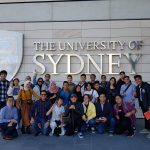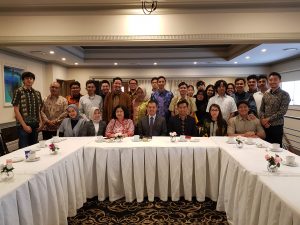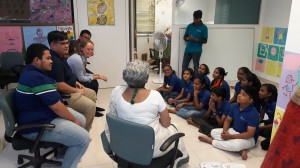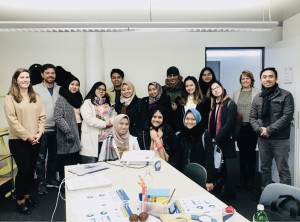 Another semester, another trip to engage in cross-cultural learning.
Another semester, another trip to engage in cross-cultural learning.
This semester (Semester 1, 2018/2019), we organized another round of international trips for Cross-Cultural and Conflict Management. Our destinations were Germany (Reutlingen), Australia (Sydney), India (Mumbai), and Switzerland (Zurich and Olten), with MBA and International Business students being the participants. The goal of the trip is to facilitate further cross-cultural learning.
Throughout the semester, students had been engaged in discussions and role plays expected to create awareness of their own cultural backgrounds (values, identities, and so on) in relation to others’ cultural backgrounds and to seek a common ground for them to work together. Differences and similarities across cultures are explored to engage in reality checks and unravel potential (cultural) biases that had (subconsciously) facilitate their decision-making processes. The trips were simply an extension of our efforts.
In Germany
For the second year in a row and occurring much earlier in September 2018 than other trips, the trip to Germany (Reutlingen) was offered specifically to undergraduate students and made possible through our collaboration with the ESB Business School of Reutlingen University (ESB). The students selected were essentially participating in a summer school organized by the ESB, also involving students from other ASEAN countries. One of the interesting parts coming out of the trip was that students were able to break some of the stereotypes about Germany and learn about some of the rationales behind how the stereotypes could not completely capture their experiences. The trip was supervised by Dr. Ira Fachira, as the Director of the Study Program in Management and a coordinator of the Double Degree Program between SBM ITB and ESB Business School for undergraduate students majoring in International Business and Business Engineering.
All other trips (Australia, India, and Switzerland) happened concurrently during the final week of November. In all trips, the schedule included university and company visits, with certain varieties across the trips.
In Australia
Supervised by Yudo Anggoro, Ph.D
Participants: MBA and International Business (undergraduate) students
The Australia Trip took place in Sydney. We started the first day by having discussion about their project and doing observation in the iconic ANZAC monument in the heart of Sydney downtown. Students discussed the cultural differences between Indonesia and Australia in various aspects. On the second day, the group visited the Sydney Startup Hub, one of the largest startup incubators in Australia. We learned about the startup development in the hub from generating ideas to getting funding from the investors. The Sydney Startup Hub accommodates hundreds of technological startups in various industries, from Fintech to online learning. Students then discussed some differences of startup development between Indonesia and Australia. On the third day, the group visited the Consulate General of Indonesia in Sydney and was warmly received by the Consul General Heru Subolo himself, highlighting that the Indonesia-Australia bilateral relationship is now at the Strategic Comprehensive Partnership level. The discussion with the Consul General also covered the new agreement between the two countries, which is the Indonesia-Australia Comprehensive Economic Partnership Agreement (IA-CEPA). On the fourth day, we received a warm welcome by Thomas Soem, the Director of International Relations at the University of Sydney. Mr. Soem explained some new initiatives from the University including the research on sustainability issues. As the oldest university in Australia, the University of Sydney strives to conduct research in the area that has not been explored before. The fifth day of the visit to Sydney brought us to the Austrade and PricewaterhouseCoopers (PwC) Australia. Austrade is the Australian government agency dealing with the country’s investment and trade in other countries. From the Austrade, we learned that the trade and investment between Indonesia and Australia could still be expanded further, covering new areas such as tourism, smart city initiatives, and sustainable transportation. At PwC, the group was greeted by the Director of Tax and Chair of the Indonesia Desk, Ms. Wendy Hartanti. Ibu Wendy delivered four case studies performed by PwC in their projects covering the issues of immigration, smart city, diversity, and economic development.

In India
Supervised by Dedy Sushandoyo, Ph.D
Participants: International Business (undergraduate) students
The India trip took place in Mumbai, known as the financial, commercial and entertainment capital of India. Supervised by Dr. Dedy Sushandoyo, the trip included five students, including one exchange student from a Danish university. The first day activities took places in the S.P. Jain Institute of Management and Research (SPJIMR), one of the Indian leading business schools in India. We were welcome by the Associate Prof. Malay Krishna and Mrs. Rashi B from the International Office. Starting with a short introduction of SPJIMR, the day continued with a lecture on Indian Culture & Consumer Insights delivered by Prof. Harini, who insightfully explained about the history of India, the Indian cultures, and how the diverse cultures of India may have implications toward marketing strategies. The day continued with a visit to Abhyudaya, a unique pedagogical approach with an aim to foster social responsibility of the SPJIMR students through experiential learning. The Associate Prof. Deepa Krishna as the Head of the Abhyudaya Project presented several initiatives conducted by Abhyudaya, including how to bring the first year MBA students of SPJIMR to mentor bright, underprivileged children from surrounding schools. Visiting Abhyudaya, we had an opportunity to interact with the children (through conducting painting together) and also by letting the children know about Indonesia and Denmark. On the second day, we visited FabIndia, an Indian chain store retailing Indian ethnic products handmade by craftsmen/women from across rural areas of India. The expectation from this visit was to inspire the students on social entrepreneurship. After that, the students visited one of the Indian best engineering universities, Indian Institute of Technology (IIT) Bombay. Here, Prof. Swati Patankar as the Dean of International Relations welcomed us, followed by the presentations from two IIT Bombay startups. The day finished by visiting the Shailesh J. Mehta School of Management of IIT Bombay. On the third day, the activity of the study trip was focussed on visiting Lijjat Papad, a social cooperative symbolising the strength of women. Then on the fourth day, we visited the Indonesian Consulate General in Mumbai, in which Mrs. Tennike Erman as the Socio-Culture Consul welcomed us. On the fifth day, the students came back to SPJIMR. Four main activities were conducted on the last day of this study trip: the SPJIMR campus visit, Panel Discussion led by Associate Prof. Sushmita Srivastava and Prof. Malay Krishna (where students discussed anything about India after almost a week-long exploration), a lecture from Associate Prof. Debraj on International Business, and Yoga.

In Switzerland
Supervised by Andika Putra Pratama, Ph.D
Participants: MBA and International Business (undergraduate) students
The Switzerland trip covered two cities: Zurich and Olten (30 to 40 minutes apart by train). On the first day, the activities took place in Zurich and included an informal morning talk with Prof. Volker Hoffmann from ETH Zurich (Expert on Sustainability and Technology) and Paulo Morais (Director of Sustinova, a not-for-profit association dealing with sustainability in the NGO area), where students also shared their thoughts on sustainability from an Indonesian perspective. In the afternoon, we visited the Zurich Impact Hub, a co-working space. The final visit was supported by our colleague from the Zurich University of Applied Sciences (ZHAW). We learned about how people came together to create something they were passionate about. The second day, also in Zurich, was spent exploring the ETH Zurich, including a meeting with Prof. Jaboury Ghazoul (Ecosystem Management) – who have had many contacts with Indonesia on sustainability issues – and a visit to the Teaching Innovations Lab with Dr. Erik Jentges, where we learned about how classes on sustainability were creatively designed to cater to the students’ needs. A meet-up with Indonesian students studying at the ETH Zurich and campus tour were also arranged. Moving on to Olten on the third day, students had an experience touring the old town of the city guided by a local resident and visited two companies (the Swiss Federal Railways in Olten and the Swiss Post in Harkingen). This was organized by the University of Applied Sciences and Arts Northwestern Switzerland (FHNW). On the fourth day, it was time for students’ presentation and a presentation about “Doing Business in Indonesia: A Cross-Cultural Lens” by Dr. Andika Putra Pratama (a reciprocal talk invited by FHNW) as well as roundtable discussions on Indonesia-ASEAN, India, and China. The audience of this session included FHNW experts (on ASEAN, India, and China) and students. The fifth day was spent exploring Switzerland a little bit more. Overall, the trip in Switzerland has exposed us to some of the practices of and issues surrounding the idea of sustainability (including comparative insights from Switzerland and Indonesia), Swiss-Indonesian partnership opportunities, and the interplay between Swiss innovations and traditions, as well as the Swiss principle of the balance of power among all people and openness to people from outside.

Further, most of our international students taking the course chose to stay in Indonesia and explore their chosen topic, such as school systems and restaurant habits. Interviews and observations were done. Such explorations were of course filtered through theories and concepts learned in class to bridge understanding between theory and practice. This applies to all trips.
The next semester, Cross-Cultural and Conflict Management is offered as an elective in the Management Program (undergraduate) and MBA Program in Bandung.
Finally, the whole point of a cross-cultural trip does not necessarily lie in the knowledge acquired during the trip, but in the motivation or aspiration to continue learning cross-culturally despite and because of the unknown. It is meant to be a trigger for more explorations, a source of motivation to challenge oneself to work across cultures and be a bridge that connects ideas and practices.
On Behalf of the Cross-Cultural and Conflict Management Team,
Thank you,
Written by
Andika Putra Pratama
Yudo Anggoro
Dedy Sushandoyo



